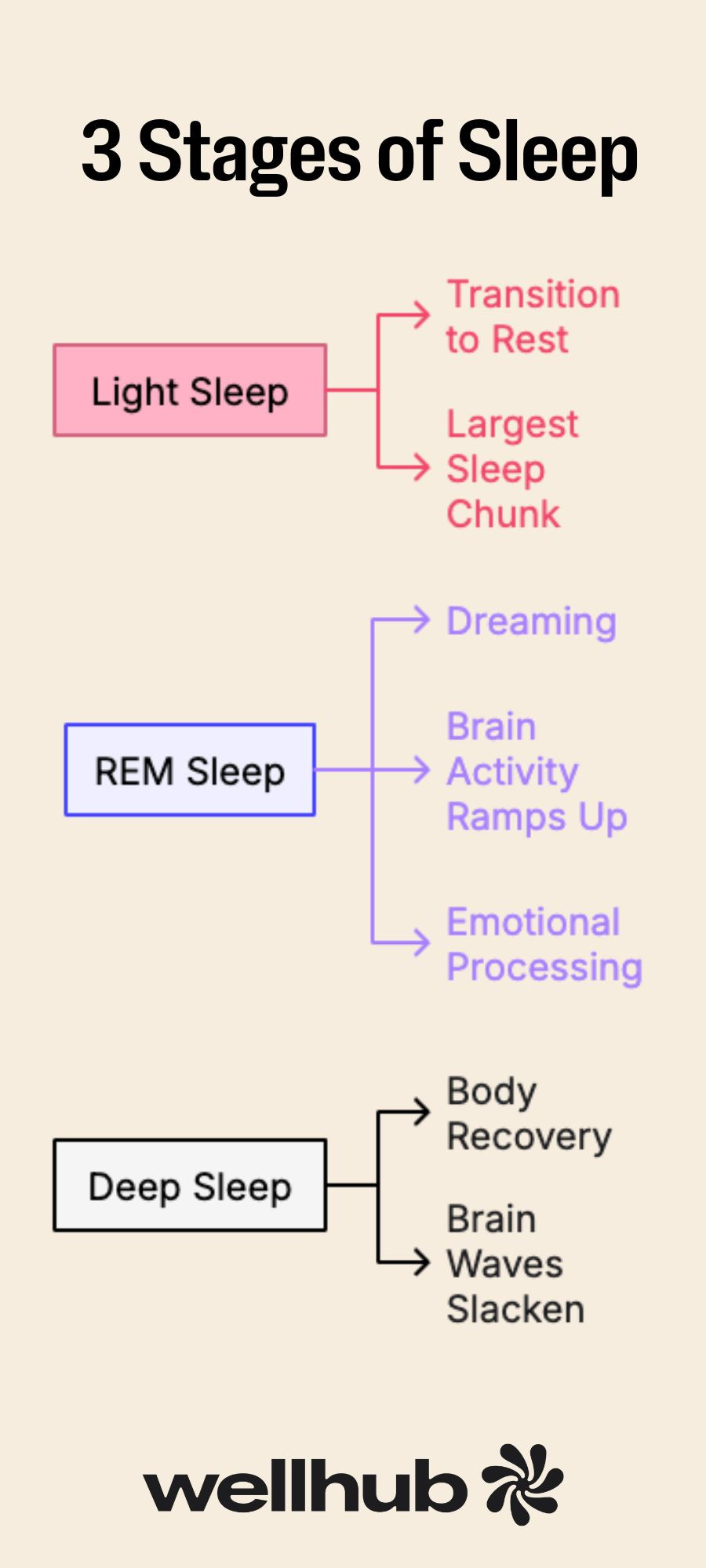How Much Deep Sleep Do You Need? The Science of Restorative Sleep, Explained
Last Updated May 6, 2025

Running low on sleep doesn’t just leave you groggy. It impacts everything — from your memory and mood to your immune system and metabolism. Without enough rest, even simple tasks start to feel like climbing a mountain in flip-flops.
Sure, logging enough hours matters. But the real game-changer? Quality sleep — especially deep sleep. Deep sleep is when your body resets, your brain reboots, and your energy tanks refuel. It’s one of the most important stages for total health, and skimping on it can cause serious ripple effects over time.
So how much deep sleep do you actually need to thrive? It depends, but one thing’s clear: not getting enough can quietly chip away at your health.
Unlock the secrets to better deep sleep, spot the signs you're missing out, and tap into simple habits that make restorative rest your new nightly norm.
What Is Deep Sleep?

Every night, your body moves through a rhythm of rest called the sleep cycle. This cycle repeats four to six times a night and flows through different stages of sleep: rapid eye movement (REM) and non-rapid eye movement (NREM), according to a 2024 sleep study.
NREM sleep has three phases — N1, N2, and N3 — and it’s N3 that brings you the deep, restorative rest your body craves. During this stage, your brain waves slow down and synchronize. Your heart rate and blood pressure dip. Your muscles relax. This stage of deep sleep isn’t just about waking up feeling refreshed (although that's a huge perk!). It also helps your immune system stay strong, supports healthy tissue growth, and locks memories into place for long-term storage.
Most people hit their deepest sleep early in the night, but everyone's sleep patterns look a little different. As the night goes on, your body naturally shifts toward lighter sleep and more REM, when most of your vivid dreaming happens.
Deep Sleep vs. REM and Light Sleep
Not all sleep is created equal. Deep sleep, REM sleep, and light sleep each play different roles in keeping your body and brain running smoothly.
- Deep sleep is when your body hits recovery mode. Your heart rate drops, blood pressure falls, and brain waves slacken.
- REM sleep is the brain’s playground. Dreaming kicks in, brain activity ramps up, and emotional processing goes into overdrive.
- Light sleep is the link. It helps you change gears from being awake to resting, and makes up the biggest chunk of your night.
Why Deep Sleep Matters
Deep sleep is a reset button your body presses every night. When that refresh is cut short, it can shake up everything from your metabolism to your mood.
Even if you clock in eight hours, you might still wake up drained if you’re not getting enough deep sleep. Sleep fragmentation — when you keep getting pulled out of deeper stages — can leave you running on empty, no matter what the clock says. Knowing how much deep sleep you need could be the key to sharper focus, a stronger immune system, and steadier emotions.
Physical Restoration and Immune Support
During deep sleep, your body’s repair crew clocks in, working to:
- Repair muscles and tissues
- Regenerate cells
- Refuel energy stores
- Boost growth hormone levels (vital for healing)
- Crank up cytokine production to fight off inflammation and infection.
When deep sleep gets disrupted, your body’s defenses don’t work as well, and staying healthy becomes an uphill battle.
Memory Consolidation and Brain Health
Deep sleep is when your brain sorts and saves everything you learned during the day. Short-term memories get filed away and brain pathways strengthen. Without enough deep sleep, remembering new information and general problem-solving feels harder. Over time, it can chip away at your brain health, too.
Emotional Regulation and Mood Stability
Deep sleep helps keep the the limbic system — the brain’s emotion hub — balanced. When deep sleep runs low, irritability and anxiety can creep in fast. Even if you’re technically sleeping enough hours, it’s the quality of your sleep that makes or breaks how you feel.
How Much Deep Sleep Do You Need?
Most adults spend about 13 to 23% of their total sleep time in deep sleep. That works out to somewhere between one and two hours a night, according to the meditation app Calm.
It’s not a one-size-fits-all number. Your needs change based on your age, how active you are, and your general health. Babies and kids need more deep sleep than adults. As we age, deep sleep naturally declines. Some of us feel great after an hour of deep sleep, while others might need closer to two.
One restless night won’t wreck you. But when deep sleep shortages stack up, it can drag down your energy and concentration.
What Affects Deep Sleep Amounts?
A few factors play into how much deep sleep you get:
- Total sleep time: Less time in bed = less chance to hit deep sleep stages.
- Age: Younger bodies usually spend more time in deep NREM sleep.
- Health conditions: Sleep apnea, chronic pain, and other disorders can block the brain from reaching deep sleep.
Other culprits? Late-night screen time, too much caffeine, and noisy environments.
Common Barriers to Deep Sleep
Even if you feel like you're doing everything "right," you may still struggle to get enough deep sleep. The culprit may come down to a daily habit or your stress levels.
Stress and Anxiety
Stress doesn’t clock out when you turn off the lights. Tension, racing thoughts, and restless energy can trick your brain into staying on high alert all night. Chronic stress shatters the sleep cycle, making every morning feel like you’re slogging through quicksand.
Screen Time and Blue Light
That one last scroll before bed? It’s wrecking your deep sleep. Blue light from your device screens delays melatonin, the hormone that sends your body the message, “It’s time to chill.” Even if you have night mode on, your brain stays fired up by bright visuals and fast-moving content. Bottom line: screens and sleep don’t mix.
Caffeine, Alcohol, and Diet
What you put into your body during the day echoes into your night.
- Caffeine can linger for hours, making deep sleep harder to reach.
- Alcohol might knock you out faster, but it disrupts the deeper stages later on.
- Heavy, spicy, or greasy meals can leave your body too busy digesting to relax fully.
A few tweaks — like cutting caffeine in the afternoon and noshing on lighter dinners — can set you up for better rest.
Irregular Sleep Schedules and Poor Sleep Hygiene
A wildly different bedtime every night throws your internal clock off. Inconsistent routines, bright lights, and noisy bedrooms make it harder for your brain to know when to power down.
Building a steady sleep environment doesn’t have to be complicated, but it does have to be consistent if you want those deep sleep benefits.
How to Get More Deep Sleep (5 Actionable Tips)
You don’t need a total lifestyle overhaul to get better sleep. Small changes and consistent habits can make a huge difference.
- Set a Consistent Sleep Routine
Same bedtime and same wake-up time. Every day — even weekends. Your internal clock loves predictability, and it rewards you with deeper, better sleep. You can start small: Move your schedule by 15 to 30 minutes until you hit your target.
- Create a Wind-Down Ritual Before Bed
High-energy activities belong earlier in the evening. As bedtime gets closer, it’s time to shift gears. Try winding down with calming activities like:
- A warm shower
- Light reading
- Gentle stretches
The goal is to tell your body: “Hey, it’s almost time to sleep.”
- Be Mindful of Diet and Exercise Habits
A few small shifts throughout your day can help stabilize your sleep cycles at night. It's best to cut out caffeine by the early afternoon, keep your later meals light, and limit your alcohol intake. Movement matters too. You don’t have to crush a HIIT workout. Even a short walk during the day can make falling into deep sleep easier.
- Reduce Evening Screen Time
Screens mess with melatonin, period. Warm filters help a little, but nothing beats good old-fashioned unplugging. Try switching off phones, TVs, and tablets at least 20 to 30 minutes before you plan to sleep. Swap in a calming podcast, soothing music, or some light meditation instead.
- Try Mindfulness or Meditation Practices
A calm mind tends to get deeper sleep. Mindfulness techniques like bedtime yoga, deep breathing, or journaling can help soothe your stress and quiet your racing mind before bed. Meditation apps are another great tool to build into your nightly rhythm.
Building Better Rest, One Night at a Time
Deep sleep is the the engine behind your physical recovery, memory consolidation, and emotional balance. Without enough of it, even simple tasks can start to feel overwhelming. Building awareness around your sleep patterns and making small, sustainable changes can help you protect your energy, focus, and overall health.
When deep sleep suffers, so does your wellbeing. Stress, screen time, and irregular habits can all block your body from reaching this vital stage. Wellhub makes it easier to prioritize your rest with access to sleep-focused resources like guided meditation apps, mindfulness programs, and calming bedtime routines that support deeper, more restorative sleep.
Check if Wellhub is included in your benefits and enroll today to unlock these tools. If not, start a petition to bring Wellhub to your company!

Want Wellhub at your company? Start a petition.
It’s completely confidential! Just follow a few steps and we'll create your official company petition page.
References
- Calm Editorial Team. (2024, May 13). REM sleep vs. deep sleep (and how much do you need of both?). Calm Blog. https://www.calm.com/blog/rem-sleep-vs-deep-sleep
- Cleveland Clinic. (2023, June 19). Sleep. https://my.clevelandclinic.org/health/body/12148-sleep-basics
- EIN Presswire. (2025, March 17). Stretchit Announces it is Now Available... KXAN. https://www.kxan.com/business/press-releases/ein-presswire/794618328/stretchit-announces-it-is-now-available-to-millions-of-employees-on-wellhub-the-leader-in-corporate-wellness/
- Patel, A. K. (2024, January 26). Physiology, sleep stages. StatPearls - NCBI Bookshelf [Internet]. https://www.ncbi.nlm.nih.gov/books/NBK526132/
- Silvani, M. I., Werder, R., & Perret, C. (2022, August 16). The influence of blue light on sleep, performance and wellbeing in young adults: A systematic review. Frontiers in Physiology. https://pmc.ncbi.nlm.nih.gov/articles/PMC9424753/
Category
Share

The Wellhub Editorial Team empowers HR leaders to support worker wellbeing. Our original research, trend analyses, and helpful how-tos provide the tools they need to improve workforce wellness in today's fast-shifting professional landscape.
Subscribe
Our weekly newsletter is your source of education and inspiration to help you create a corporate wellness program that actually matters.
Subscribe
Our weekly newsletter is your source of education and inspiration to help you create a corporate wellness program that actually matters.
You May Also Like

Women Gym Owners And Founders To Celebrate This International Women’s Day | Wellhub
For International Women’s Day, we put the spotlight on women-owned and founded gyms across the country that deserve a moment to shine.

Black-Owned And Founded Fitness And Wellness Businesses To Support
Check out these black-owned and founded gyms, studios, and fitness and wellness companies and the many ways you can support them.

5 Fun Workouts To Spice Up Your Fitness Routine | Wellhub
Here are five fun workouts and studios to shake up your circuit and keep your fitness routine from falling into an exercise rut.